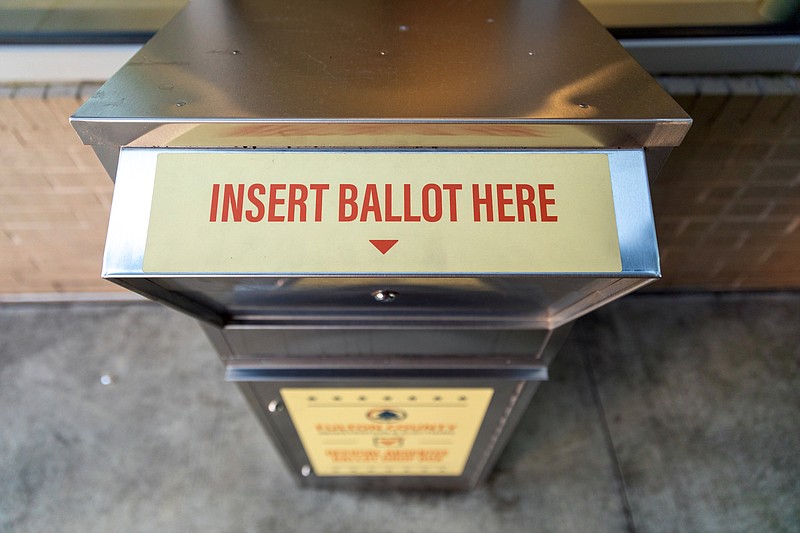Martin Luther King would have turned 93 on Saturday had he not been killed by a sniper's bullet on April 23, 1968, as he stood on a motel balcony in Memphis.
No doubt King, who in 1964 won the Nobel Peace Prize for advancing racial equality and social justice, would be shocked today to find there's still an enormous fight going on for voting rights and equality.
No doubt, too, he would be horrified to find there still is the same kind of deep racism in many that prompted James Earl Ray to follow King's movements, rent a room across the street from the Memphis motel, buy a rifle and binoculars and squeeze the trigger as King paused to tease Jesse Jackson about not being appropriately dressed for dinner.
How is it that today's members of our Congress can't find their way to make it easier - not harder - for all of us to vote?
We're not talking about making it easier to buy a gun, to legalize marijuana, to get or not get a vaccine. We're talking about making it easy to exercise our constitutional right - no, duty - to vote.
Yet no Republicans in the House of Representatives voted on Aug. 24 for the Freedom to Vote: The John Lewis Act.
Tell us, Chuck Fleischmann and Scott DesJarlais, representing Southeast Tennessee and more: What is there not to support about online and automatic voter registration, about allowing 14 days of early voting in every state, about uniform standards for voter ID and mail-in voting?
Explain to us Marjorie Taylor Green and Andrew Clyde of North Georgia: What is not to like about making Election Day a federal holiday, about protecting election officials from interference, about election security funding, about federal guidelines on now congressional districts are drawn?
We need to know, Mo Brooks and Bob Aderholt, representing Northeast Alabama: What can you possibly find suspect about prohibiting states from making some voters in some districts wait in unbearably long lines to cast a vote without a drink of water?
To all of you:
What's wrong with making it a federal crime to lie to voters about the date of an election or a polling location?
Why shouldn't people who have served their time for crimes not have their voting rights restored?
Why shouldn't we be able to register to vote on the same day we vote and why shouldn't late-arriving, mail-in ballots be counted if they are postmarked by election day?
And why shouldn't we bring back "preclearance" - a process in which states with track records of discriminating against voters of color must get approval from the Justice Department on voting rule changes?
As King's son, Martin Luther King III, said Saturday: "The stakes could not be higher" to protect and expand his father's legacy by passing measures that strengthen voter rights.
His correct assertion comes as we wait for the next move on these questions in the U.S. Senate this week.
Last week, President Joe Biden, who served in the Senate 36 years, pointed out in a fiery speech in Atlanta that when the Voting Rights Act extension was passed in 2006, it received a vote of 390-33 in the House and 98-0 in the Senate. That took bipartisan action "with votes from 16 current sitting Republicans in this United States Senate." Now, however, those 16 oppose something as basic today as it was then?
Biden thundered: "I ask every elected official in America. How do you want to be remembered? ... Do you want to be ... on the side of Dr. King or George Wallace? Do you want to be on the side of John Lewis or Bull Connor? Do you want to be on the side of Abraham Lincoln or Jefferson Davis?"
Meanwhile, Democratic Sens. Joe Manchin of West Virginia and Kyrsten Sinema of Arizona said they remain opposed to changing filibuster rules to pass the legislation over the Republican brick wall.
What? Like the filibuster is a sacred thing that hasn't been changed and tweaked and even overturned and returned scores of times before?
Any guesses about how Tennessee Sens. Marsha Blackburn and Bill Hagerty will vote?
Just follow their tweets.
Hagerty, the guy who was the disgraced former president's U.S. ambassador to Japan, tweeted Saturday:
"Dems are happy to use the filibuster on elements Republicans would like to see, but when it comes to their abject power grab of our election laws, they're willing to call us any name in the book & destroy the Senate to do it."
And here's Blackburn's tweet from last Tuesday: "Joe Biden should focus on solving the crises he's created in the past year rather than starting a new one. We all know this is not about voting rights."
Oh, yeah. It's that "power grab" thing again. You may recall all the way back to February 2020 when Blackburn blocked an attempt by Democratic Sen. Mark Warner of Virginia to pass three election security-related bills via unanimous consent - including one that would require campaigns to call the FBI if they're offered help from a foreign power.
She called those security bills "a federal power grab."
The only power grab going on here is the one by Republicans and two lost Democrats who fear they cannot be elected if all of us can actually vote and be counted in states that do not monkey with our freedoms.
